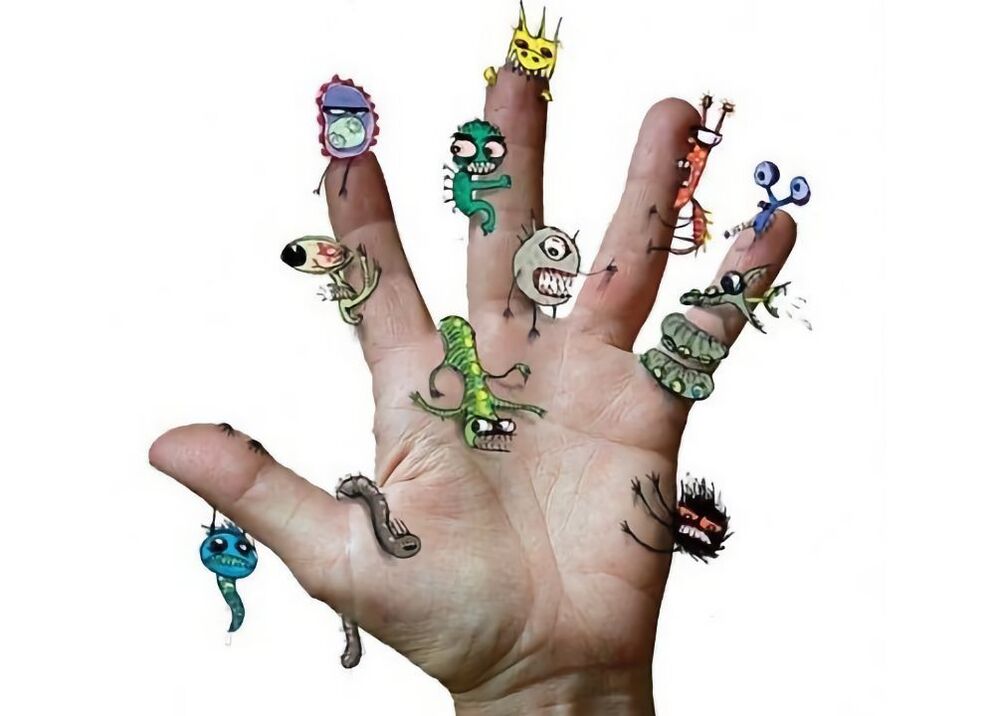
According to WHO, every second person on the planet is infected with helminths every year. Many people think that parasitic worms do not cause much harm to health. But everything is not so simple: helminths can affect important internal organs: heart, lungs and brain.
Helminths - who are they?
Helminths are parasitic worms that can choose a human, animal or plant organism as a host. In general, there are three classes of helminths:
- tapeworms. This class includes about 3. 5 thousand types of helminths. Parasitic worms vary in length from a few mm to 10-15 meters;
- flakes.Parasites are so named because they have suckers that they use to get food. The human body can infect about 4 inches of the species. As a rule, the length of worms does not exceed 5 cm;
- roundworms.This class of helminths has more than 24 thousand species. Roundworms are spindle-shaped. Usually their length does not exceed 0. 5 meters.
You can get infected with helminths in different ways. However, in most cases, parasitic invasion occurs for the following reasons:
- Poor hand hygiene.
- unwashed vegetables, fruits; undercooked or undercooked meat, fish - the use of such products increases the risk of parasitic invasion many times.
- Keep food open outside the refrigerator. Insects can transfer helminth eggs to products stored without packaging.
- Contact with pets.
The main signs of the presence of parasites in the body:
- nausea, vomiting, diarrhea;
- lose weight;
- allergic rashes;
- swelling;
- itching in the anus;
- grinding teeth in sleep.
Learn more about the symptoms of parasites in the bodyread our article.
What are the most common helminths in our country? Let's consider the most common types of parasitic worms and the diseases they cause.
Tapeworms
The body of the tapeworm consists of segments, the total number of which is from 3 to 5000. The main element of helminth fixation is the head, and its accessories are suction cups and hooks.
The most common causes of tapeworms are:
Diphyllobothriasis
The causative agent of the disease is a broad tapeworm that affects the human intestines.Development of worm eggs occurs in fresh water. The scheme of tapeworm entry into the human body is as follows:
- Worm eggs are swallowed by crustaceans living in the reservoir.
- Infected crustaceans are eaten by fish.
- Humans become infected with the parasite by eating fish that has undergone insufficient heat treatment.
Symptoms of the disease develop 1. 5 months after infection. The main symptom of the pathology is the presence of whitish fragments of helminths in the feces.
Sticking to the intestinal mucosa, the tapeworm absorbs large amounts of vitamin B12. For this reason, people with diphyllobothriosis often develop anemia. In addition, tapeworm can cause increased liver, spleen, intestinal obstruction.
Teniarhynchosis
The causative agent of the disease is a bovine tapeworm that lives mainly in the small intestine of humans. During the development period, the helminth replaces two hosts: the intermediate is cattle, the main is man. Bull tapeworm can live in the body for 20 years, multiply and harm health. The disease is common in many regions, but is most common in colder areas.
As a rule, people get taenarynchosis after eating undercooked or undercooked beef.
The disease often continues without obvious symptoms and is discovered accidentally when a person sees helminth elements in feces. In some people, in addition to the main symptoms of infection with helminths, there may be pain on the right side of the front abdominal wall.
Adult helminths can penetrate the appendages, pancreatic ducts, bile ducts, and provoke acute inflammatory processes in them. Intestinal obstruction may develop with multiple parasitic infestations.
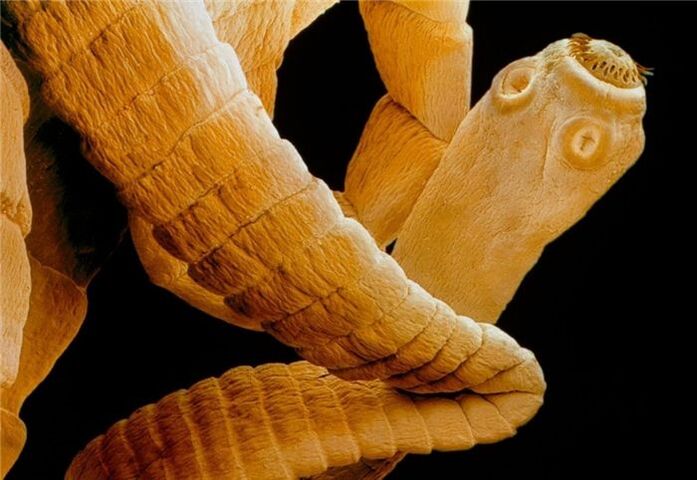
taeniasis
The causative agent of the disease is pork tapeworm, which initially affects the human small intestine.Human infection occurs as a result of consumption of raw or undercooked pork.
The parasite can penetrate into various organs and tissues and cause pain in the abdomen, back, and limbs. The most favorable pathology occurs when the worm is localized in subcutaneous fat and skeletal muscle tissue. When penetrating the eye muscles, helminths cause a decrease in visual acuity, lacrimation and photophobia. The defeat of the pork tapeworm of the brain can be fatal.
flakes
Flukes have a leaf-like shape and are distinguished by their high reproduction capacity at different stages of their life cycle. Reproduction of worms is possible not only sexually with fertilization, but also without it. In addition to worms, worms have many hooks and spikes, thanks to which they are securely attached to the mucous membranes of organs.
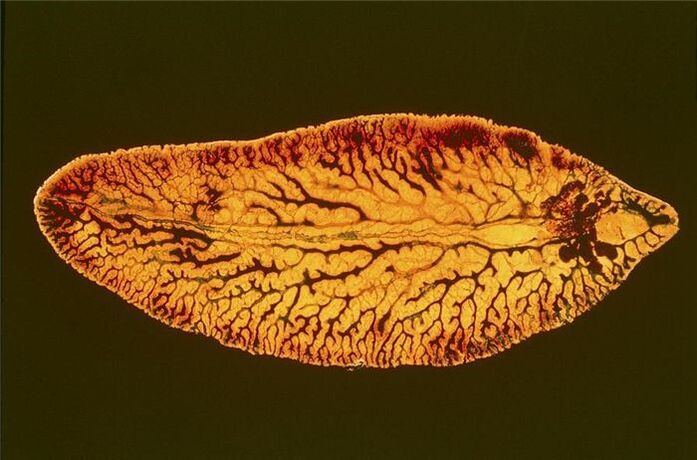
Common pathologies caused by flukes:
- fasciolosis;
- opisthorchosis;
- paragonimiasis.
Fascioliasis
Fascioliasis occurs when the liver or gallbladder is damaged by hepatic hemorrhage.Mostly, the infection occurs when eating vegetables irrigated with water from open reservoirs.
In addition to the standard symptoms of parasite infection, a person may experience asthmatic attacks accompanied by shortness of breath, facial flushing, dilated pupils, and tachycardia. Obstructive jaundice develops if an adult causes obstruction of the bile ducts. Pathological signs:
- cramping pain in right hypochondrium;
- yellowing of the skin;
- temperature;
- colorless stool.
Opisthorchosis
The causative agent of the disease is the cat bird. The name of the parasite comes from the fact that it infects cats and other fish-eating mammals in addition to humans.
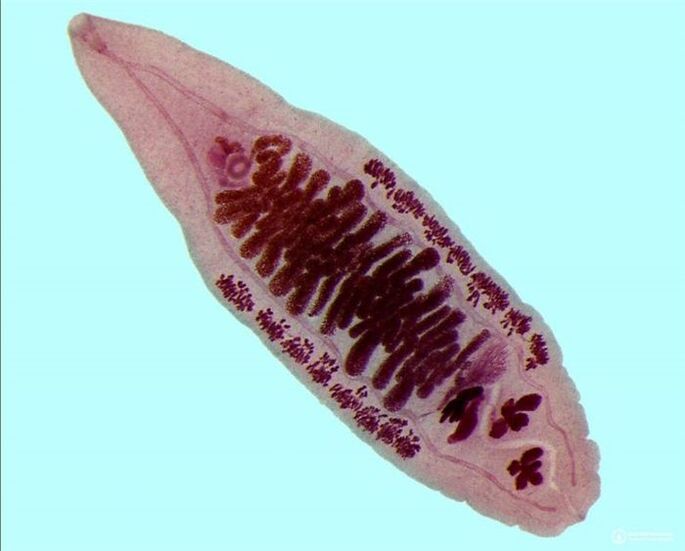
As a rule, it affects the liver and pancreas, causing inflammation in the organs. Symptoms vary and depend on the number of parasites. The patient may feel:
- signs of intoxication;
- temperature,
- hives;
- skin itching;
- pain in muscles, joints, right hypochondrium.
In some cases, helminths cause an increase in lymph nodes and the development of jaundice. The chronic form of the pathology often causes hepatitis, liver cirrhosis.
Paragonimiasis
The culprit of the disease is a pulmonary fluke that enters the human body together with infected crustaceans.
First, the parasite enters the human intestine, then the abdominal cavity. The end point of its journey is lung tissue. In addition, the worm can penetrate the brain and affect the central nervous system.
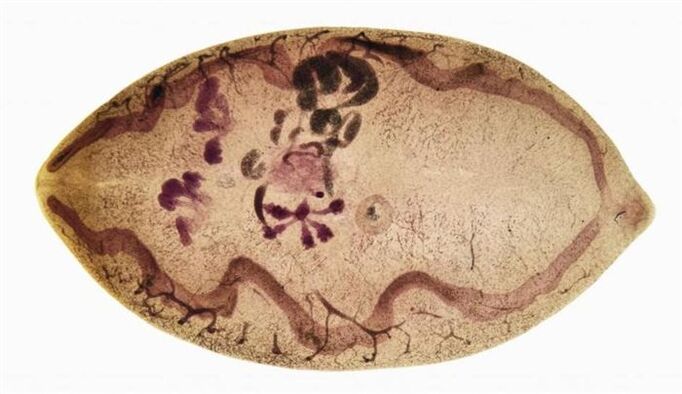
Specific signs of parasitic invasion of the lungs:
- chest pain syndrome;
- cough with sputum that may contain pus and blood;
- temperature.
In some cases, helminths cause a violation of the ventilation function of the lungs and gas exchange during breathing.
roundworms
Due to their structure, roundworms (nematodes) can live even in extreme conditions.Their body is covered with a three-layer skin-muscle sac that reliably protects parasites from external influences.
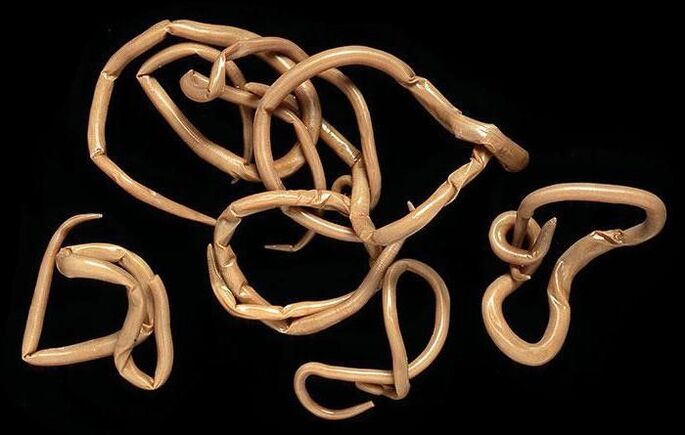
Common diseases caused by nematodes:
- ascariasis;
- enterobiosis;
- trichinosis.
ascariasis
The development of the disease is first provoked by a roundworm fixed in the small intestine. The average length of adults is 40 cm.Parasitic larvae can enter the human digestive system with unwashed vegetables and fruits, contaminated water.Also, poor hand washing before eating is often the cause of ascariasis.
During the penetration of the larvae into the body, a person may have a subfebrile temperature, allergic rashes, cough with clear sputum. Symptoms of the intestinal stage of ascariasis (diarrhea, abdominal pain) are observed only when there are several parasites. As a rule, living in the intestines of a worm is asymptomatic.
Complications of multiple parasitic infestations:
- obstruction of the bile duct;
- purulent inflammatory processes in the gallbladder, liver;
- inflammation of the appendix;
- intestinal obstruction.
Enterobiosis
The provocateurs of the disease are pinworms - small worms up to 1 cm long.Helminths penetrate the human digestive system in the same way as roundworms.
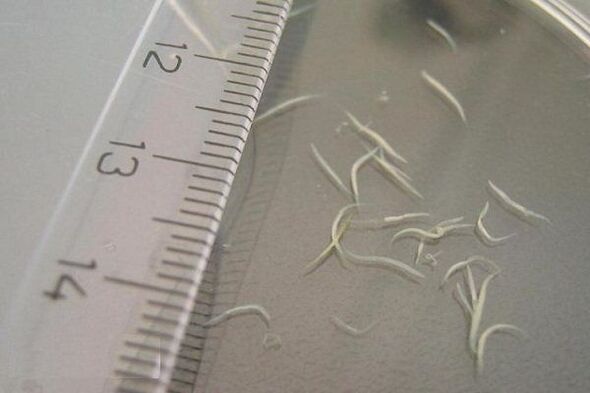
Currently, enterobiosis is the most common parasitic pathology in the world. Mostly, the disease is diagnosed in children under 10 years old.
Symptoms, as in previous cases, develop only with multiple parasitic invasions. Children often have diarrhea, mucus in the feces, difficult and painful digestion, itching in the anus, nausea. In severe cases of the disease, leg cramps may occur. In addition, pinworms can penetrate the genitals and cause acute inflammation in them.
Trichinosis
This disease provokes Trichinella, one of the smallest parasitic worms. The length of the parasite rarely exceeds 4 mm. In the larval stage, worms can infect skeletal muscles. The exception is the myocardium - the muscle tissue of the heart. Adults parasitize in the small intestine.
As a rule, human infection occurs when eating half-cooked pork.At the same time, it is enough to consume only 30 g of meat affected by parasites for the development of the disease.
It manifests itself with the standard symptoms of pathological parasitic invasion. In the advanced stage, there may be swelling of the eyelids, face, arms and legs, pain in the lower back and chewing muscles. Possible complications are complete or partial loss of mobility, paralysis of the respiratory tract.
How to prevent infection with helminths?
To reduce the risk of infection with parasitic worms, it is important to observe the following rules:
18 signs of parasites in the body
Being present in the human body, the parasite has a serious, pathogenic effect. At the same time, the same parasite can cause multiple mechanisms of action in humans at the same time.
WHO estimates that currently about four and a half billion people in the world constantly suffer from various parasites.
This problem is also very relevant, because the diagnosis of parasitosis is very difficult. Worm infestations (a large collection of parasitic diseases) are present in humans even when the parasite is already out. And if the patient saw this, then he will certainly come to the medical institution. Parasitosis can also be detected during a preventive examination. But unfortunately, these cases are a drop in the ocean.
Mechanisms of action:
mechanical effect.For example, if a roundworm is in the intestines, it will naturally compress and damage the intestinal wall. In some cases, it causes an inflammatory process. For example, if echinococcus is located in the liver, lungs or kidneys, tissue compression will occur accordingly. This is a classic, mechanical effect: explosion, pressure, dysfunction of the organ or system in which the parasite is present. Not only are there many luminal parasites present in the gastrointestinal tract, but there are also many tissue parasites that can fully perform the so-called mechanical movement.
Stimulation of allergic reactions.Unfortunately, when a person has allergic reactions, he starts going in circles: to a dermatologist, a pediatrician, a general practitioner, an allergist, but doctors do not always rule out the presence of parasitic infestations in the body. first place.
Any parasite, even a banal pinworm, can cause severe allergic reactions, and they can be different both on the skin and in the bronchopulmonary tree. For example, frequent obstructive bronchitis in children may be due to the presence of some kind of parasite in the intestines.
Effect on microflora.It's no secret that humans are the globe for the vast world of microbiota. The microflora inhabiting all our mucous membranes, skin, organs, and tissues is the friendly microflora that produces vitamins, minerals, hormones, and enzymes for us and helps our body to live normally. And now, unfortunately, in the presence of parasites, it begins to actively die.
immunosuppressive activity.Today, it is clearly proven that the wastes of parasites severely inhibit the immune system. They just block. Moreover, over millions of years, parasites have learned to mimic and hide from the immune system by producing special anti-enzymes. Thus, it blocks the immune system and sometimes a person can suffer from various parasitosis for decades. Which sooner or later causes serious diseases in the body as a whole or in a separate organ or system.
Effect of antienzymes. Unfortunately, parasites can't just deplete our bodies. If we try to drink vitamin foods, mineralized, complex, consume vitamins and minerals, they will not always benefit us, because our freeloaders will take the lion's share of them.
Mechanism of action of nerve reflexes.The waste products of parasites poison the nervous system. And often it can affect the psycho-emotional state of both adults and children. Any psychosomatic illness can be associated with parasitic infestation. The child may have hyperreactivity or, on the contrary, lethargy, tearfulness, depression - all this may be the result of the presence of a parasite in the body. For example, the simplest Giardia produces such toxins. Even if they are in microdoses, they are still toxins, the same as psychotropic substances. Of course, with such persistent poisoning, a child or an adult will experience a serious strain on the work of the central nervous system. And all kinds of psychological and mental disorders can arise from here: sleep disorders, nervous disorders, various psychological problems. Moreover, neither the parents nor the patient himself, if he is an adult, can even think that this is due to parasitic infestation.
In my opinion, the most serious and terrible thing is the stimulation of neoplasms by parasites. Long-term presence of parasitosis in the body can cause a problem such as the formation of neoplasms: benign and malignant. Moreover, the stimulation of neoplasms can be associated with two factors.
The first factor is the direct, damaging effect of the tissues of a particular organ.
The second factor is action mediated by acute inhibition of the immune system. The fact is that the part of the immune system responsible for antiparasitic defense is also responsible for antitumor protection. As a result of improper division, cancer cells can be formed in the human body. At this time, the deficiency of the immune system will manifest itself in such a way that this cell will not be recognized by our immune cells in time and will not be killed over time.
When can a person suspect the presence of parasites?
Now I will explain to you a list of clinical manifestations of parasitic infestations, in the presence of which you should contact your doctor to clarify whether you really have this diagnosis.
- The most common clinical symptom is itching in the anus. This is heard by many people, therefore, it is associated with the presence of parasites, especially in children's practice.
- Grinding teeth in a dream. Again, this can happen very often in children's practice. Mothers suddenly notice that the child begins to clench his teeth in his sleep. Why does this happen? Often, creaking in children is associated with scary dreams. This is the mechanism of toxic effects on the central nervous system that we are talking about. The child has a terrible dream and clenches his teeth in fear. This is one of the reasons. There are other reasons as well. The occurrence of trismus or an increase in the tone of the chewing muscles, which can also be a symptom in this case.
- Saliva during sleep, saliva in the morning, nausea when brushing the teeth in the morning. All these are manifestations that can indirectly indicate the presence of parasitic invasion in the body.
- Peeling of fingers and toes, peeling of the skin in layers.
- Increased hunger, sometimes to the point of fainting.
- Allergic rashes on the skin. When lecturing doctors, I often draw attention to the fact that doctors are not in a hurry to give antiallergic drugs to this or that patient. First, understand to the end - are there helminthic invasions? Because a sudden high degree of allergy in a person in a short period of time may indicate the presence of a parasitic infestation in the patient.
- Rashes on the eyelids, their peeling, swelling. , mental disorders of unknown cause.
- Any skin irritation. Especially in children's practice. First of all, it is necessary to exclude the presence of parasitic attacks.
- He is troubled by symptoms such as bloating, boiling in the abdomen, irregular stools. Any problem of the gastrointestinal tract.
- Absence of body weight or, conversely, overweight. Parasitosis can be both.
- Having several chronic diseases at the same time. Diseases of joints, bronchopulmonary tree, gastrointestinal tract. If suddenly a person begins to get sick in stages, then one, then the second, then the third, then the fifth, then the tenth, and if at first there were no apparent reasons for this, this is an opportunity to think about its existence. parasites in the body.
- He is in poor health and the diagnosis is unclear. Such patients can refer to different specialists and try to examine one or the other. And in the end, the diagnosis will still be uncertain and the health condition will remain poor.
- Inexplicable pains in the abdomen, fleeting, sudden spasms, pulling pains. It is necessary to exclude the presence of parasites, especially in children's practice.
- Long-term toxic-allergic manifestations. Periodically appearing suddenly, inexplicable allergic reactions to food.
- Persistent anemia. When hemoglobin is significantly reduced and difficult to correct. First of all, it is worth thinking about the presence of parasitic attacks in the human body.
- In children: retardation in physical, psychosomatic, psychoemotional development, hyperreactivity or, on the contrary, lethargy, poor mastery of material in schoolchildren - all this may indicate the presence of hidden parasitosis in the body.
- Prolonged lymphadenopathy (a condition manifested by an increase in the nodes of the lymphatic system), recurrent lymphadenitis can also indicate the presence of parasitic infestations.
I listed the main clinical signs of parasitosis. Notice how wide they are. And with these symptoms, the patient can turn to almost any doctor. It is considered that if a person has found two or three such signs, he is already subjected to a more comprehensive examination or an antiparasitic program for the presence of parasitosis.
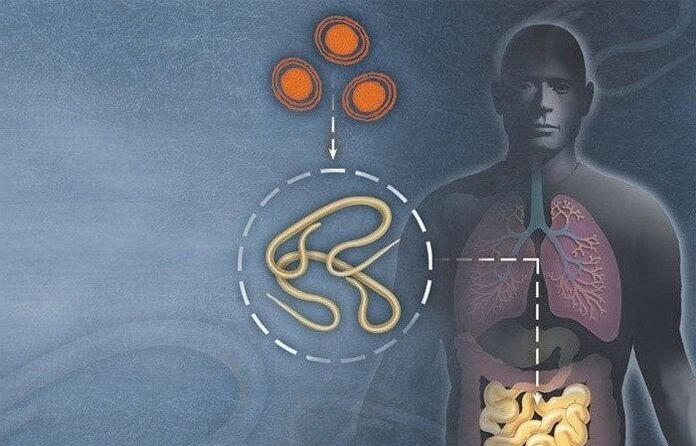
During the consultation, you will be able to voice your problem, the doctor will clarify the situation, decipher the tests, answer your questions and give the necessary recommendations.
I want to draw the attention of people who want to self-medicate. If you come to the pharmacy and ask the pharmacist: "Give me something for worms", then you are making a big mistake - these things cannot be done. First, the pharmacist is not responsible for how you take this medicine. Second, he is not responsible for the results. Third, you can hurt yourself a lot. Don't do that. In order to find out if there is a parasitic infection, it is very important to contact a specialist, go through a certain examination list and only then undergo an adequate course of treatment.
What tests will show the presence of parasites in the human body?
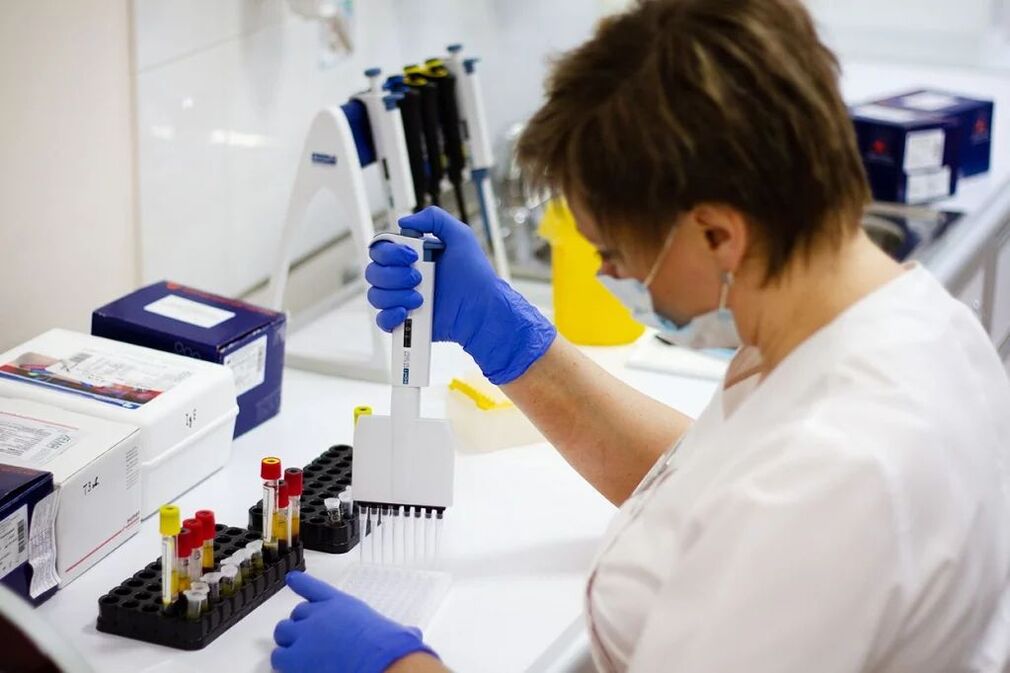
According to WHO statistics, about 4. 5 billion people in the world are constantly infected with parasites. This situation is complicated by the fact that the diagnosis of parasitic infections is very difficult. How to find out if there are parasites in the body? What laboratory and instrumental research methods can detect parasitosis? Let's consider these questions in detail.
Complications
Helminthiasis caused by common types of parasites can be treated with medications prescribed by a doctor. But if you do not pay attention to disturbing symptoms, deterioration of health, weakness, unexplained fatigue, reduced immunity, the disease can cause serious complications.
If the parasites enter the lungs and the patient does not consult a doctor with complaints of cough, shortness of breath, chest pain, shortness of breath, pneumonia or even bronchial asthma.
Parasites in the digestive system can cause diseases such as cirrhosis, liver abscess, hepatitis, intestinal cancer, gastrointestinal bleeding, accumulation of fluid in the abdominal cavity (ascites) and peritonitis. They also often lead to the development of chronic kidney disease, meningoencephalitis, and vision loss. Some cestodes (tapeworms) grow over 1 meter in length, and small roundworms can form tight balls. This disrupts the normal functioning of the body, causes severe intoxication, and obvious allergic reactions. Death is possible without emergency medical care.
Prevention
Helminthosis often occurs when hygiene is not followed or food is not properly processed. To prevent helminthic infestation, you need:
- Do not wear other people's underwear, do not share towels with strangers.
- Wash your hands thoroughly before eating - it is important to do this not only before breakfast, lunch, dinner, but also before a snack.
- Wash your hands after using the toilet.
- Wash your hands thoroughly after working on the beds and do all gardening work with thick rubber gloves.
- Use only clean water for drinking and cooking.
- Wash fruits and vegetables thoroughly under running water.
- Eat heat-treated meat, fish, and seafood.
- Do not buy products on spontaneous markets from people who cannot confirm the safety of the goods.
- Monitor the health of pets, regularly deworm even if the pet lives in the apartment and does not go outside. Contact your veterinarian to select medications and calculate the dosage.
- Maintain cleanliness in living and working areas. Sometimes people bring helminth eggs under their shoes. To reduce the risk of infection, it is necessary to regularly perform wet cleaning and disinfect all surfaces.
Even following these rules, it is impossible to completely eliminate the risk of infection. To prevent the development of the disease, consult a therapist. The doctor will prescribe drugs to prevent helminthiasis. Don't forget to tell us how often you travel, whether you have pets at home, or your personal area. It is recommended to carry out drug prevention of helminthiasis twice a year.
















































